Arjun Sagar Gupta: The Piano Man who’s jazzing up the club scene in Delhi-NCR
A chat with Arjun Sagar Gupta—the brain behind The Piano Man Group—helps us understand more about his inclination towards jazz music and how he has built an incredible jazz culture over the years through dedicated spaces.
Think jazz in Delhi-NCR and the first name that strikes you is that of The Piano Man (TPM). While I’ve always enjoyed tuning into different musical genres, jazz had eluded me until 2016. That year, on the insistence of a few friends, I made my way to TPM’s Safdarjung outpost in upscale South Delhi, and, boy, was it magical! Right from the décor to the food and the drinks, everything was on point.
So, I was elated beyond words when TPM Gurgaon (much closer for me) opened. It became a routine to head there every few weeks and enjoy jazz over a drink or two. This jazz club—which is much bigger than the one in Delhi—was welcomed with open arms. The atmosphere, always warm and inviting, exudes a vintage vibe, particularly with the addition of dark wood and a trumpet chandelier.

The trumpet chandelier at The Piano Man Gurgaon | Image: The Piano Man
Weekdays or weekends, people made a beeline to the place to immerse themselves in jazz music. Never before had I witnessed such a promising jazz culture that swept the young and the old alike.
Founder and CEO, Arjun Sagar Gupta, who is the brain behind The Piano Man Group, is an electronics engineer and a Fulbright music scholar. Although he has no background in food and beverage (F&B), he chose to walk down this path and give Delhi-NCR a dedicated space for jazz—something they could call their own.
In a chat with YS Life, Gupta spills the beans on everything from his first brush with jazz to building The Piano Man, and more.
Love affair with jazz
It’s not that Gupta’s family had even the minutest association with musicians. His father, an avid music lover, headed the international business for Maruti for almost two decades, for which he would travel the world, especially across South America and Africa. Upon his return, he would always bring back an eclectic range of music.
“I was fortunate enough to grow up in an environment with music from all over the world, much before the dawn of streaming and YouTube. I had eclectic exposure to music during my childhood,” says Gupta.

Arjun Sagar Gupta, the brain behind The Piano Man | Image: The Piano Man
“When I was in high school, my brother gave me a music CD that became my introduction to jazz. It had Louis Armstrong singing WC Handy’s Blues,” he continues, adding that he instantly fell in love with the sound.
After this, he started to explore, listen, and play more jazz.
A few decades ago, the cities of Kolkata, Mumbai and Delhi had a vibrant and flourishing jazz culture. Gupta recalls several restaurants in Connaught Place, the heartbeat of the national capital, which showcased jazz bands. In fact, one of his school teachers too played at one of these restaurants in the 70s and 80s.
“It’s not like Delhi never had any exposure to jazz. In the mid-80s, a group of people got together and formed the Capital Jazz; Soli Sorabjee was its President. They introduced an annual festival called the Jazz Yatra, which brought in extraordinary musicians from all over the world," he illustrates.
“I was in high school then, when I started volunteering as an usher, since my uncle was one of the founding members of Capital Jazz,” he adds.
That’s when Gupta learnt about stage management and the tropes behind running a festival. But, even then, he had no inclination towards jazz or even the slightest idea that he would end up being the owner of jazz clubs.
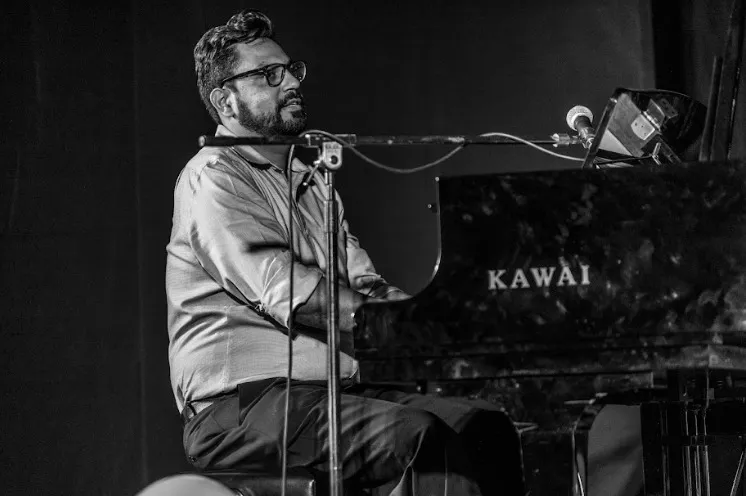
Arjun Sagar Gupta on the piano
“I am an electronics engineer; I was very focused and worked with a bunch of companies. Later, I studied architecture in Frankfurt. There was no F&B on the horizon until the end of 2009,” he says.
It was then that he and a couple of friends started a bakery called Cake Away. A few years later, Gupta got the opportunity to take over a small space in a café they were supplying to, at Basant Lok in Delhi, and thus, The Piano Man was born.
After Gupta opened the first space, he realised it was a café where musicians were playing, but it was “half here and half there”. This realisation led him to build a proper music venue at Safdarjung in 2015, where musicians would love to perform, where Gupta would have enjoyed himself too.
Building blocks of The Piano Man
On the reason behind the name, Gupta says that, in 2012, when he was starting out, he was completely clueless about what to call the space.
“I’ll be brutally honest that we didn’t have the best names,” he confesses. “I remember my family and I were sitting in the living room, just a few weeks ahead of the launch. That’s when my father came up with the name.”
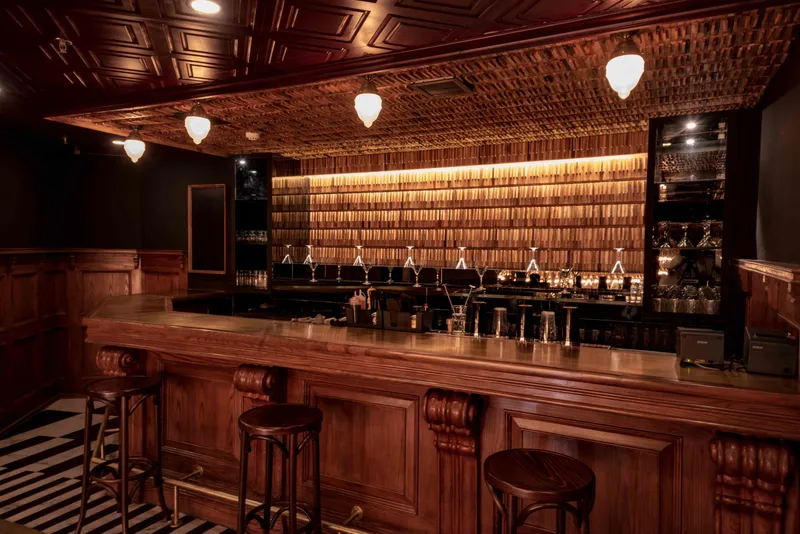
The bar at The Piano Man
Although the name The Piano Man sounded interesting to him, Gupta slept over it for a few days. As time passed, he realised they were on the right track.
“It also made sense from the perspective that I am a pianist, who has been performing for 25 years now. At the same time, it’s an ode to all the phenomenal musicians instrumental in building a jazz culture.”
The TPM culture
The Piano Man Jazz Club, Safdarjung and The Piano Man Gurgaon host talented musicians from across the globe, because Gupta believes that “one can’t build culture if you exclude any groups of people.”
Some of the musicians include 27 Grammy awards winner Chick Corea, Jojo Mayer, and Ivan Santos.

Artists performing at The Piano Man | Image: The Piano Man
Gupta has consciously refrained from imposing any dress code at his clubs. Similarly, with artists, it’s more about the effort, time and energy that goes into building the craft, says the jazz club owner.
“If you’re a good musician, our stage is always open. It’s not about the number of people you will bring in,” he says.
“I believe there are always three parties involved—the performer, the organiser, and the promoter. At The Piano Man, we take the responsibility of being a promoter; we don’t expect artists to do that. It’s an honour to have incredible musicians perform here, also because the kids today are far ahead of where we were at their age,” Gupta adds.
TPM also runs a successful festival called ‘Giants of Jazz’. The festival started out in 2015, but the Covid-19 pandemic brought it to a standstill for a couple of years. It resumed last year, albeit in a smaller format, but plans are on to scale it up this year.
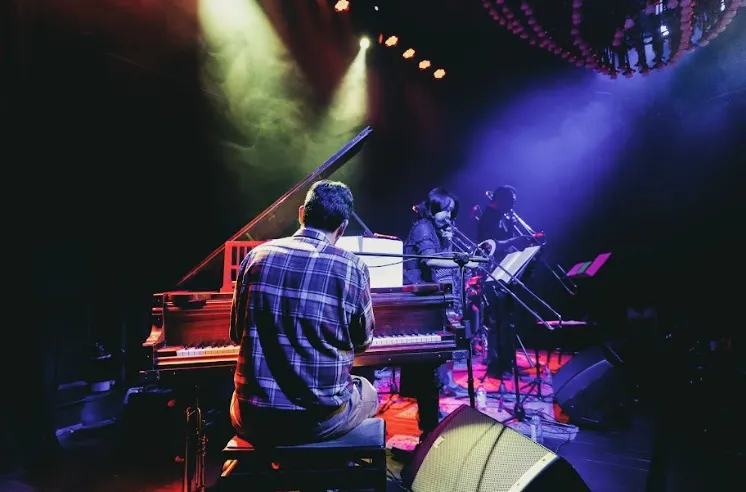
Artists performing at The Piano Man
The 10-day musical gala was created with an intent to put together a line-up of international artists and give audiences a real taste of jazz music.
“There’s a daily exposure to music anyway at our clubs, barring a few holidays. But having 10 days dedicated to a festival allows us to have a deeper penetration into the audience,” elaborates Gupta.
“Something like this takes a lot of time, effort, money and thought. It also becomes a larger flashpoint to bring people in, allow them to make a decision, and hopefully see them again for other shows.”
A beautiful curation of diverse elements
TPM’s outlets are tastefully done up; the décor and design will leave you awestruck at first glance. Creating a space like this is no mean feat, which is why Gupta is focussed on both the design and the architecture of the space.
Amith Chhabra, who heads Livin’ Colors Design, is the architect behind all the TPM clubs.
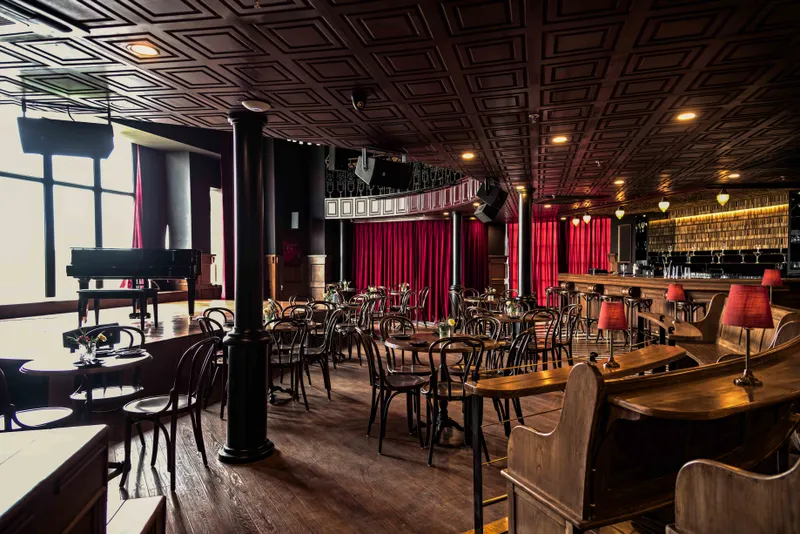
Amith Chhabra has designed all The Piano Man clubs
When Gupta, a first-generation entrepreneur, was in the process of launching the Safdarjung property, he had met about eight to ten architects. During this process, he would always request his father, Rakesh Gupta (Partner, The Piano Man Group) to offer his perspective. The duo knew Chhabra was the right choice, even if he was more expensive than the others.
Pushkar Thakur, a New Delhi-based multi-hyphenate design and art professional who runs The Grafiosi, had worked on the logo and branding of TPM, incorporating subtle, beautiful elements.
“Everyone who has been involved has put in a significant amount of thought into building the brand,” shares Gupta.
As for the food at TPM, the credit goes to Manoj Pandey, TPM’s partner-chef, who is the brain behind the club’s diverse offerings. Gupta reiterates that all the teams at TPM are always in the process of evolution, ideating and scouting interesting ideas to enhance the experience at the club.
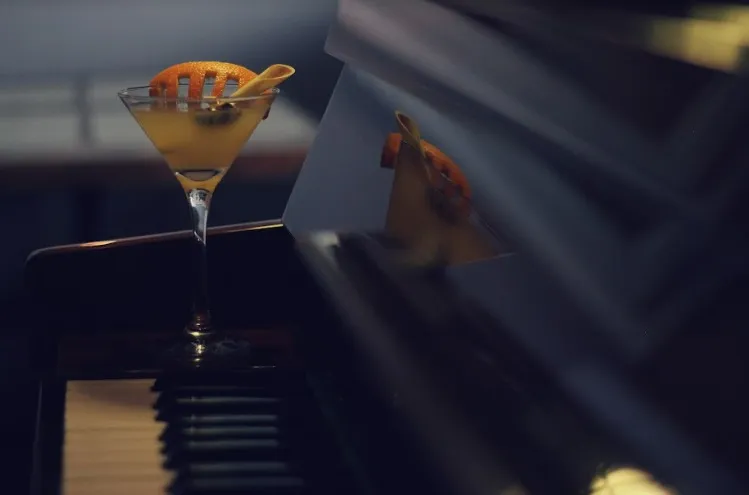
The Dancing on the Piano cocktail at The Piano Man
“I want my chef to have freedom and creativity, just like a musician on stage. Of course, I am always there to sit down and evaluate things that you’ve come up with. Together, we present something fun,” he breaks it down.
“There’s a boundary where you want to create and present a phenomenal product. But, inside that boundary, there’s a lot of space for freedom for each team.”
We sampled the thoughtfully curated Chef’s Table menu at TPM Gurgaon. Every bite of the dishes—Edamame and Truffle dimsums, Beetroot Carpaccio, Sushi Tacos, Duck Confit, Lamb Chops, and Tom Kha—was relished immensely. The meal ended with crunchy Matcha and Macarons, and, not to forget, paired with exotic cocktails.

Duck Confit at The Piano Man
The TPM outlets attract patrons who are looking to explore the spaces and may have never experienced a live concert. They aren’t limited to jazz lovers, as TPM’s spaces also offer other music genres such as classic rock, blues and pop. While the age demographic is wide, most of the guests are in their 30s and 40s.
What’s next?
After making waves with the first two outlets, Gupta is all set to open the third outpost in Malviya Nagar in Delhi. Eventually, TPM is looking to expand to other parts of India.
“It’s a question of managerial competency. One unit to multiple units in the same geographical area is significantly difficult, but it’s manageable because I am the promoter and accessible to all these units.”
But a multi-city operation, Gupta believes, requires greater managerial capability. “I think we, as an organisation, needed more time to build that internally. When we expand to multiple cities, we want to be able to ensure a delivery of product that our Delhi audiences have come to expect. We are not in a hurry for growth, we want quality delivery,” he concludes.
Edited by Swetha Kannan







